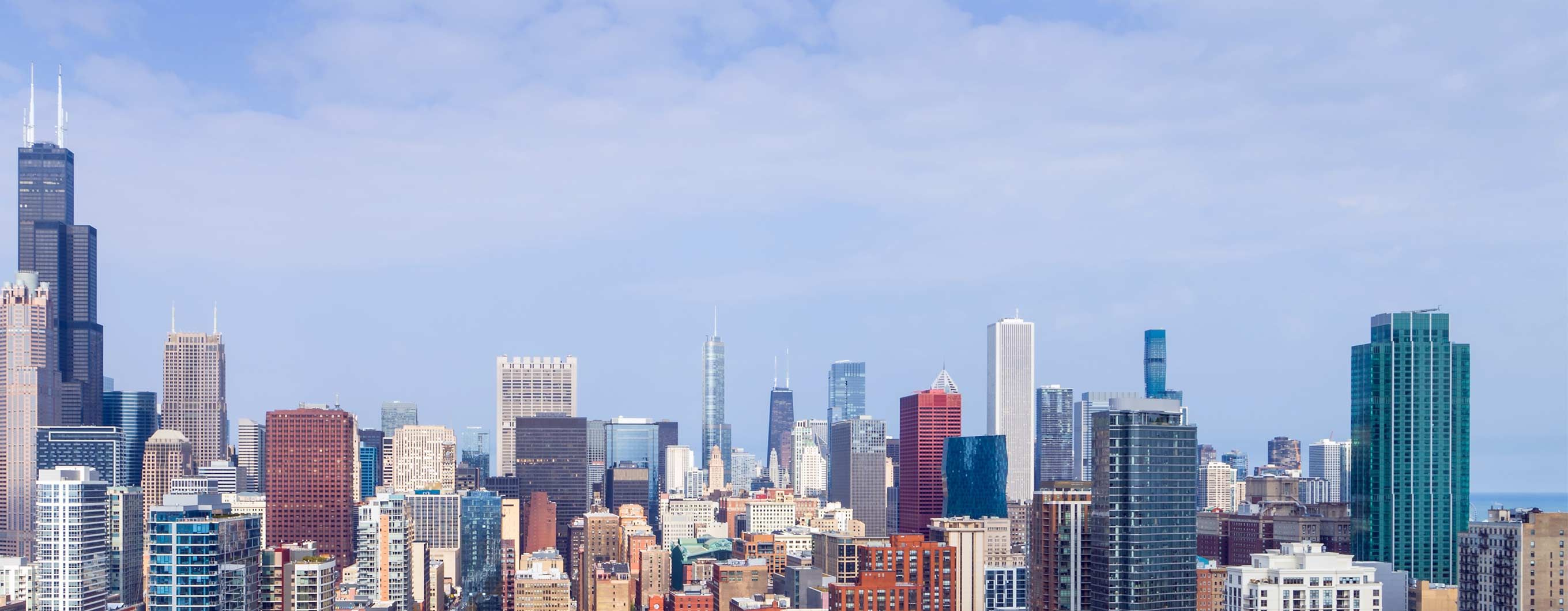
Homeowners Insurance in Illinois
If you’ve lived in Illinois for some time, you know the state can experience some pretty severe weather. From harsh winters to severe summer storms, Illinois homeowners face a variety of weather-related challenges that can unexpectedly damage their property.
While the pros of living in the Prairie State definitely outweigh the cons, that doesn’t mean you shouldn’t take the necessary steps to protect yourself and your home. Below, we’ve outlined what you need to know about getting Illinois home insurance.
What is the average homeowners insurance cost in Illinois?
Illinois home insurance costs an average of $2,245 per year, which is 11% less than the national average of $2,522. Out of the entire U.S., Illinois is the 24th most expensive state for home insurance (it’s also the same price of six tickets to see the Chicago Bears play in person).
Illinois is an excellent place to live if you’re looking for more affordable housing. Not only are its home insurance premiums below the national average, but its home prices are too. The average home in Illinois costs $265,824, while the U.S. average is $362,481.
Despite its affordability, house insurance in Illinois has been gradually increasing over the past few years. This table shows the average annual home insurance rates in Illinois for the last five years:
Year | Average annual home insurance cost in Illinois |
|---|---|
2024 (projected) | $2,245 |
2023 | $2,050 |
2022 | $1,753 |
2021 | $1,223 |
2020 | $1,144 |
*Data from Insurify and the Insurance Information Institute.
Insurify projects that home insurance costs will increase by 10% in Illinois from 2023 to 2024 — a faster rate than the national average (6%). This is primarily due to construction costs increasing throughout the state, as well as a slight uptick in natural disasters.
You deserve smarter home insurance
What factors influence my home insurance rate?
There are a lot of factors that play into how much you’ll pay for homeowners insurance in Illinois:
- Location. You may notice that home insurance quotes in Chicago are higher than homeowners insurance quotes in other parts of Illinois, like Anchor, Chenoa, and Le Roy.
- Average age of your home. You may pay more for insurance if you have an older home because it could be constructed with outdated building materials that need to be brought up to code if damaged.
- Home features and upgrades. If your home has safety features like burglar alarms, smoke detectors, and fire sprinkler systems, these can all lower your premium. Having upgraded electrical, plumbing, and heating systems can also help reduce rates.
- Coverage limits and deductibles. Your home insurance rate will usually be higher if you need a larger coverage amount. Likewise, choosing a lower deductible will also raise your premiums, but it means you’ll pay less out of pocket when you file a claim.
- Credit score. In Illinois, insurers are allowed to use your credit score as the leading factor in determining your home insurance rate. You’ll save the most money if you have an excellent score. It’s estimated that 85% of home insurance companies use credit scores to calculate rates.
- Claims history. If you or the home you live in has a history of filing claims, insurers may view you as a higher risk and charge more for home insurance in Illinois.
Common insurance discounts in Illinois
As you shop for Illinois home insurance, you may notice that some insurers offer discounts to help you lower premiums even more. Some common discounts you may come across include:
- Multi-policy discount. Many insurers, including Hippo, offer discounts for bundling your home insurance with other policies (like auto insurance).
- Home security discount. Installing safety devices like burglar alarms, smoke detectors, and fire sprinkler systems can qualify you for a discount on your home insurance premium. Hippo provides many customers with basic Smart Home devices for free, and activating these devices can lead to additional discounts.
- New home and home buyer discount. If your home is newly built or recently purchased, you may be eligible for a discount. Hippo offers a Home Buyer Discount for customers who have purchased their home within the 12 months prior to the policy's effective date.
- Loss-free discount. If you haven’t filed any claims for a certain period (usually three to five years), you may receive a discount on your premium. Hippo offers this discount to eligible customers.
- Affinity discount. Some insurers, like Hippo, give discounts to customers who purchase insurance through groups such as businesses, colleges, universities, membership clubs, or home service providers.
- Impact-resistant roof discount. Around 90% of Illinois experiences at least one day of hail per year. Luckily, installing a hail-resistant roof could make you eligible for a discount.
- HOA discount. Some insurers, including Hippo, offer discounts to customers whose homes are located in qualifying HOAs.
Tips for lowering home insurance rates
Aside from discounts, there are other steps you can take to pay less for homeowners insurance in Illinois.
- Consider switching insurance providers. It takes as little as 60 seconds to get an insurance quote in Illinois with Hippo. Ideally, you should get quotes from at least three insurance companies so you can compare rates side by side.
- Increase your deductible. Your deductible is the amount you agree to pay upfront before insurance will pay a claim. If you agree to pay a higher deductible, your premiums will usually be lower.
- Install solar panels to your roof to save on monthly utility bills. Illinois gets an average of 198 sunny days a year, making it a great state for solar energy. You can even get solar panel insurance to protect your investment.
- Maintain a good credit score. Home insurers in Illinois can use your credit score to estimate your premium. Work on improving your score, and you may see it pay off in the form of cheaper insurance.
What does Illinois home insurance cover?
Standard homeowners insurance in Illinois offers coverage in the event of perils like fires, windstorms and theft. Most home insurance policies cover:
- Your home’s physical structure (the bricks, mortar, and everything that makes your house stand)
- Your personal possessions (all the stuff you own, like clothing, furniture, appliances, electronics)
- Additional structures (like that shed or detached garage where you keep your lawnmower
- Liability protection (in case someone gets hurt on your property and decides to sue)
- Living expenses (if you need to stay somewhere else while your home is being repaired after a covered loss)
Additional Illinois insurance coverage options
Though Illinois home insurance can cover most potential accidents, policies don’t protect you against some of the state’s most considerable risks (without supplemental coverage, that is). Luckily, there are insurance riders or separate policies you can purchase to help protect your homes against common insurance exclusions.
- Flood insurance. Standard home insurance in Illinois doesn’t cover floods, yet floods are a common weather event in the state. You can purchase flood insurance through the National Flood Insurance Program (NFIP) or a private insurer.
- Earthquake insurance. Illinois has experienced several earthquakes in the past, particularly in the southern part of the state near the New Madrid Seismic Zone. Earthquake damage isn't covered under standard policies, so if you live in an area at risk for earthquakes, consider getting catastrophe insurance.
- Mine subsidence coverage. Mine subsidence is a unique risk in Illinois. If you live in one of the 34 counties where mine subsidence coverage is legally required, your insurer must offer it. If not, you can still opt to add this coverage to your policy for added protection.
- Sewer backup coverage. Sewer backups can cause major damage to your home, but they're not always covered under standard policies. Adding sewer backup coverage can help protect you from these costly incidents.
- Scheduled personal property coverage. Home insurance often has sublimits for personal belongings. If you own high-value items like jewelry, electronics, art, antiques, or other collectibles, adding scheduled personal property coverage allows you to get fully reimbursed for them if they’re stolen or damaged after a covered event.
- Identity theft protection. Some insurers offer identity theft protection as a rider to help you financially and legally recover from identity theft.
- Home-based business coverage. If you run a business from your home, you may need home-based business coverage to protect your equipment and liability risks.
What coverage is recommended in Illinois?
At a minimum, make sure you have enough dwelling coverage to completely rebuild your home if it's destroyed by a covered peril. This is known as replacement cost coverage, and it’s based on local construction costs in your area.
Also, check what additional coverage you need. Depending on your location, you may need flood insurance, earthquake insurance or mine subsidence coverage.
Lastly, talk to your insurance provider. They can tell you about the specific risks in your area and help you determine how much home insurance you need.
Is it mandatory to have condo insurance in Illinois?
If you live in a condominium, you’ll need condo insurance in Illinois. Condo insurance, also known as an HO-6 policy, covers your personal property, the interior of your home, and your personal liability. It can also cover additional living expenses if you can’t live in your home temporarily after a covered event.
Your condo association will have a master policy that covers the common areas and the building's exterior. But it won’t include things inside your unit (hence why you need condo insurance in Illinois).
The Illinois Condominium Property Act requires condo associations to have this minimum insurance coverage:
- Property insurance for the full replacement cost of the common elements and units.
- General liability insurance with a minimum coverage of $1,000,000.
- Directors' and officers' liability insurance with a minimum coverage of $1,000,000.
- Fidelity bond coverage protects against employee dishonesty, with minimum coverage equal to three months of assessments plus reserve funds.
Insuring your home in Illinois
Getting homeowners insurance in Illinois is as simple as grabbing a few insurance quotes online and choosing the company that fits your needs the best. While we recommend checking out Hippo first thing, you should know you also have other options to get the protection you need.
Once you find a policy, you can apply online, schedule a home insurance inspection (if required), and pay your premiums.
While uncommon, some Illinois residents may find themselves having trouble securing coverage for their homes. This could be due to living in a high-risk area, missing several payments or having a long history of claims. In this case, you can always turn to the Illinois Fair Access to Insurance Requirements (FAIR) Plan Association.
FAIR is a non-profit insurance association that provides affordable homeowners insurance in Illinois if you’re unable to purchase coverage. To qualify, you must have had three unsuccessful attempts to buy insurance from other companies.
Whether you live in Chicago, Marion, or Springfield, homeowners insurance is always a good idea. When it comes to getting the best protection for your home, our Hippo insurance agents will make sure you get a customized policy for a fair price. It’s just what we do.
Is Illinois homeowners insurance required by law?
State law doesn’t require you to have home insurance in Illinois. But if you have a mortgage, your lender will require it.
If you own your place outright, it's up to you whether to get coverage. But given how expensive it can be to rebuild your home from scratch, having insurance is a smart move. Without it, you could get stuck paying for damage or legal problems out of your own pocket.
Looking for homeowners insurance in a different state?
Still have questions?
Still have questions about homeowners insurance in Illinois? Explore these frequently asked questions.
Why is homeowners insurance so high in Illinois?
Home insurance in Illinois is slightly cheaper than the U.S. average — $2,245 per year versus $2,522. Still, premiums aren’t as low as in some other states like Vermont, where premiums average about $918 per year. This is because Illinois experiences its fair share of severe weather storms—including thunderstorms, tornadoes, floods and strong winds.
How much is homeowners insurance in Chicago?
Home insurance in Chicago costs around $3,460 per year, according to Insurance.com. This premium is higher than the state average due to higher home values and the severe weather patterns the city experiences.
What happens if you don't have insurance in Illinois?
Home insurance isn’t legally required in Illinois. But if you have a mortgage and let your policy lapse, your lender may force-place insurance on your behalf. Force-placed insurance is often more expensive and provides less coverage than getting home insurance on your own. If you’re mortgage-free and don’t have insurance, you’ll be financially responsible for legal liability and any damage that happens to your home.
Do you need flood insurance in Illinois?
Illinois is a flood-prone state, so it’s very likely you’ll need flood insurance, even if you don’t live near a body of water. According to the Illinois Department of Natural Resources, floods make up over 90% of declared disasters in Illinois, and it’s estimated that 15% of the state’s land area is flood-prone. You can look up your address in FEMA’s flood map service center to find out how likely your area is to flood. Even if you live in a low-risk area, it may still be worth purchasing a policy.
What is the most likely natural disaster in Illinois?
Floods, tornados, and earthquakes are the three most common natural disasters in Illinois, according to the Illinois Department of Insurance. The state is known to experience everything from golf-sized ball hail to ice dams.
How much is condo insurance in Illinois?
Insurance.com estimates that Illinois condo insurance costs around $571 per year. This premium is based on $60,000 in personal property coverage, $300,000 in liability coverage, and a $1,000 deductible.
This article is for informational purposes only and was compiled from sources not affiliated with Hippo. While we believe this information to be reliable, we do not guarantee its accuracy or completeness. For any insurance-related decision, please consult your licensed insurance producer.



